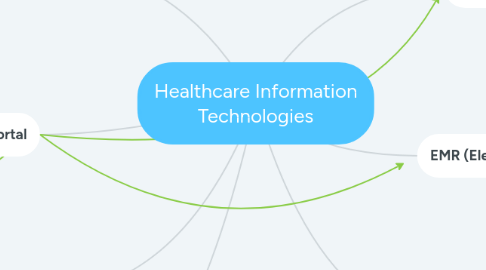Healthcare Information Technologies
von Rashad Austin

1. EHR (Electronic Health Records)
1.1. Provides patient history.
1.2. Provides patient diagnosis.
1.3. Provides treatments, medications, allergies, X-rays, test results, etc.
2. Patient Portal
2.1. Provides patients with access to their medical records.
2.2. Provides patients with medical history (medications, results, etc.)
3. Scheduling
3.1. Allows patients to schedule a check up.
3.2. Reduces wait time by not having to call in to schedule an appointment.
4. ePrescribing
4.1. Sends prescriptions to patients' pharmacy electronically.
4.2. Eliminates mix-ups due to poor handwriting
5. Practice Management
5.1. Helps run practice more efficiently.
6. EMR (Electronic Medical Records)
6.1. Replaced paper medical records.
6.2. Track data over time.
6.3. Helps diagnose and treat patients by comparing their health data and their history.
7. Medical Billing
7.1. Automates the writing, sending, and processing of medical billing.


